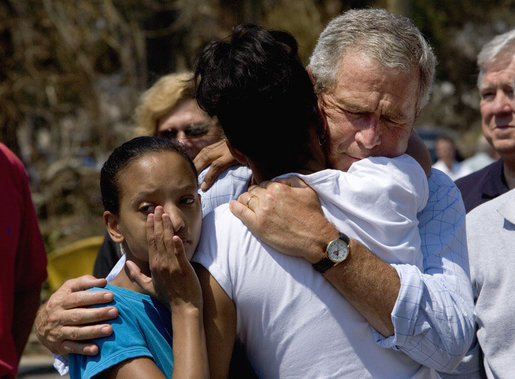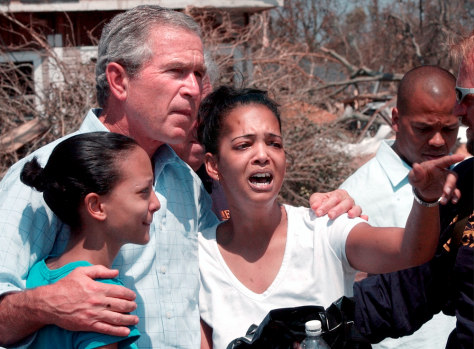It's not every decade that I get to see firsthand what is meant by a work of fiction being "ahead of its time."
Star Trek is certainly no stranger to this; the original series boasts the first interracial kiss on US television, at a time when
people were burning down radio stations for playing Janis Ian's "Society's Child." It also featured a Russian character played by an actor of Soviet descent at the height of the Cold War.
But 24 years ago, the third series of the franchise premiered:
Deep Space Nine. And over the course of the show, the story would take twists and turns that, re-watching it today in the current political climate, seem oddly...prescient.
I'm not saying Obama was the real-world Benjamin Sisko. But where we are as a nation is right around the end of the show's fifth season. The Cardassians have taken the station. The Dominion is on the move.
While there has been plenty of analysis of the show as a World War II allegory (which it was obviously meant to be), in relation to today's crisis, I think one of the most important points the series makes is that when dealing with existential threats, there is a razor-thin line to walk that will get you through to the other side. Deviate from that line in any way whatsoever? And you'll either end up as the monster you're fighting, or you'll be torn limb from limb by it.
Two sixth season episodes in particular illustrate this point: "Rocks and Shoals" and "In the Pale Moonlight."
"Rocks and Shoals" is an illustration, bit by bit, of how Major Kira -- who survived the series' equivalent of the Holocaust as a child -- slides into a mindset of rationalization and cooperation in order to survive the Cardassian takeover of the station. A kind of Stockholm Syndrome that one of her people's religious leaders, Vedek Yassim, tries over the course of the episode to clue her into. Eventually, Yassim commits a public suicide in protest of the occupation. And it's only after that, that Kira begins to realize that she's being complicit in not only her own oppression, but that of the entire Alpha Quadrant.
"In the Pale Moonlight" involves Sisko and Garak hatching a plan to get the Romulans into the war as allies against The Dominion. The plan involves manufacturing evidence that The Dominion were planning to violate the non-aggression pact with the Romulans. The short version is that while it doesn't go off exactly as planned, it
does happen. Albeit with more unnecessary death and manipulation than Sisko originally wished for.
What these two episodes represent are the two fates on either side of that razor-thin line. Giving up all of your scruples in order to survive, as Kira did, or trying to keep your hands clean, as Sisko tried to do.
We have, at the moment, two extreme factions of progressives. The first faction are The Collaborators. People who think they can compromise with Trump's regime in order to escape unscathed, or at least minimally scathed. If you want examples,
look no further than this chart. The only Trump cabinet nominee to receive zero votes from Democrats was Betsy DeVos. All others -- including Jeff Sessions for Attorney General and
Rick Perry of all people for Secretary of Energy -- have received at least one vote from Democratic senators, many of whom have shown an astonishing willingness to placate the new administration. In particular Joe Manchin (WV) and Heidi Heitkamp (ND), whose No votes
combined can be counted on a single set of hands.
And no, not even Bernie Sanders, the self-appointed anti-corruption guru of the Senate, has really stood up to Trump all that much. On the contrary, he even declared Trump would
have him as an ally if he "stands up to corporate America" like he promised to do; Sanders then went on to vote Yes (along with the rest of Congress) to confirm Shulkin for the Secretary of Veterans Affairs, despite Shulkin's ties to for-profit healthcare and his
not even being a veteran, a first for the position.
But it's not just Sanders. It's the entire activist landscape and everyone in it who advocates "working with" the new administration rather than opposing it and "empathizing with" the people who voted for Trump, even when they'd been some of Trump's staunchest opponents during the campaign. Spineless louts like
Jim Wright,
Kyle Plantz,
Michael Lerner, and
Les Leopold -- unsurprisingly, all white men -- who gleefully throw progressive causes under the bus if they have something to gain in this new era.
Capitulating to oppression -- and that includes the "wait and see, give him a chance" kind of capitulation -- is like a bystander telling someone about to be raped "hey, you might enjoy it." It's just as callous, cruel, and morally reprehensible as committing the rape themselves. If you
don't feel scared in Trump's America, it's because you have no reason to. And rather than going with the flow and being a Collaborator, it means you, of all people, have
even more of an obligation to be part of the Resistance.
For Major Kira, it took witnessing Vedek Yassim's public suicide in the middle of The Promenade to knock that into her head. Dare we even
ask what it's going to take for Manchin and Heitkamp?
The other faction is something of an ideological carbon filter. The side that seeks to remove "impurities" within its own movement. You'll recognize this group as anyone who voted for Gary Johnson or Jill Stein or wrote in Harambe or stayed home or literally did anything other than cast a vote for Clinton. People who are still screaming that Bernie would've won (but won't say how). People who are
protesting against Democrats not because of how they're voting but who they're funded by. People whose only mission is "shaking up the establishment" and don't really give a rat's ass what happens as a result.
Some have begun to refer to this faction as the "Alt-Left" (as opposed to the "Alt-Right"), but I think that's giving them entirely too much legitimacy. Being made up largely of the same demographic that finds Trump an attractive candidate, I think it's far more appropriate to simply refer to them as populist anarchists. It's even more telling when, faced with direct comparison to white nationalist propaganda outlet
Breitbart, Cenk Uygur is
more perturbed at being compared to a publication with fewer unique viewers rather than because
Breitbart openly promotes bigotry and Nazi ideas. They're not even two sides of the same coin so much as two parts of the same side of the coin; popular anarchy is the smooth and shiny background, while white nationalism is the stark, in-your-face relief.
This faction, like the Tea Party before it, seeks to essentially kick out everyone that doesn't fall into goose-stepping formation with their ideology of political campaigns run on everyone stuffing $20 in an envelope. For one thing, not everyone has that $20 to throw into an envelope. And even if they did? As someone who has had to work an annual fundraising event for the last 4 years, and for an organization that doesn't require anywhere
near the kind of penetration that a political office campaign does,
you can't get elected without money. It's just not possible. You
have to court large donors if you expect to even win the primary, because coordinating advertising, voter registration drives, and the dissemination of info on vital shit like deadlines takes a fuckton of cash.
Bernie Sanders learned this lesson the hard way. A
big part of the reason he didn't get the nomination was because he simply did not run his campaign very well, and his numbers in actual primaries (as opposed to caucuses) reflected that. A huge part of campaigning is registration drives,
particularly in primaries because they're closed in most states; you have to be registered as a Democrat in order to vote in the Democratic primary (whereas the national election is completely open; it doesn't matter what party affiliation you have as long as you're registered to vote). Sanders did not do enough to get people who were already registered as Independents in closed primary states to change their party affiliation in order to vote for him in time, or to get new voters who supported him registered as Democrats in time to cast their primary ballots. This had nothing whatsoever to do with the DNC; Sanders could've done this regardless of how much the DNC favored Clinton's campaign (rightfully so, being that she
is a Democrat, and the DNC actually gave Sanders some very generous accommodation by letting him run on the Democratic ticket without changing his party; they would've been perfectly within their rights to tell him "LOL NOPE"). But he didn't, because he couldn't. Because his campaign simply did not have the money to pull it off, since he snubbed corporate donors.
Sisko's lesson in "In the Pale Moonlight" is that sometimes, you have to strike a deal with the Devil in order prevent the apocalypse. You have to do things that aren't ideologically -- or even morally --
pure. But you have to do them in order to prevent a total catastrophe from happening. It was a lesson that anyone who voted third party and anyone who still insists they were right to do so is deliberately trying not to learn. Or to put it another way, they're ignoring the 109th Ferengi Rule of Acquisition: dignity and an empty sack is worth the sack.
Resistance in the Trump Era is a moral imperative. We cannot compromise. We cannot "work with him." And at the same time, we may have to do things we find ideologically repugnant in order to have any chance at all of avoiding disaster. We fucked up not by "disregarding the economic anxiety of the white working class" but by
not uniting against a very obvious threat. We fucked up by not recognizing evil when it was staring us in the face, and sacrificing unity and victory simply because doing something ideologically impure was an inconvenience.
We must learn from that mistake, or pay dearly for it. We have a moral imperative to fix this mess. Now is not the time for an ideological war with our party's establishment. Unify and survive. Resist or perish.
As Vedek Yassim's final words commanded,
"Evil must be opposed!"


